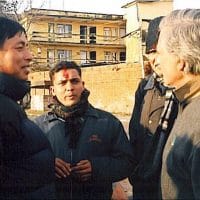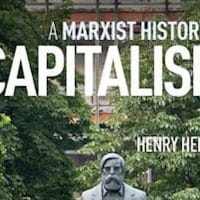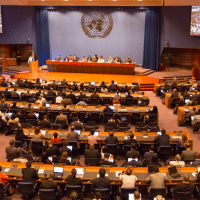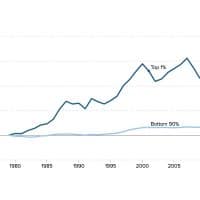-
Dossier 10: Argentina goes back to the IMF
For six months, Argentina has been confronted with a new economic and social crisis on a massive scale. In the context the devaluation of local currency, rising inflation, and a deep recession, Mauricio Macri’s administration struck an agreement with the IMF, marking a major shift in the country’s future. The agreements slash public spending and prioritize the repayment of debt, among other measures. This dossier examines the different dimensions of the crisis, the open disputes, and the possibilities for the immediate future.
-
Meeting Comrade Pasang, Nepal’s Vice President: Dispatch by a far-flung Bolivarian
How can politics be a way of pursuing the same goals once pursued in war? And through what form of politics? The career of Pasang, from revolutionary military commander to Vice President of Nepal, raises a host of questions about the transition from war to politics and the conditions of victory in each sphere.
-
“Hell No!’—Stokely Carmichael twenty years on
Within a timeframe of hardly four years, Stokely Carmichael’s organizational efforts evolved from the mobilization of black voters in Alabama and Mississippi to building a large movement resisting the military draft at the height of the Vietnam war, culminating in the SNCC’s “Hell No! We Won’t Go!” campaign.
-
A political seesaw
It would be a mistake to see Germany’s Greens as radical, well to the left. While the Greens stress environment above all, they have decided that this does not require conflict with big business, which must simply be convinced that ecology and profits can be combined.
-
You only run for the border when you see the whole city running as well
Sitting in his office, Donald Trump meets with the head of his economic advisors Gary Cohn. Cohn jokes with Trump. He says, make a speech and say that the wall on the U.S.-Mexico border is ready to be built: the materials are on hand, labour is eager. The only thing that engineers are worrying about is how to spell–over the 2000-kilometre border–the word TRUMP.
-
Watch the film the Israel lobby didn’t want you to see
The Electronic Intifada has obtained a complete copy of The Lobby–USA, a four-part undercover investigation by Al Jazeera into Israel’s covert influence campaign in the United States.
-
With Samir Amin by our side
Brazil’s election result is appalling. Jair Bolsonaro, who will take office early next year, will be the most extremist head of government on the planet. If he cuts down the Amazon Rain Forest–as he promises–it will be catastrophic for life.
-
The crisis of capital
It may be hard, but I want you to try to think back a decade, actually slightly less than a decade. In 2000, we were celebrating the millennium, and if you remember what was happening at that time, it was an enormous celebration of a new global capitalism, of globalization, of the end of conflict in the world, of a new world order.
-
How can we make “Abolish ICE” a reality?
Two of the immigrant rights movement’s historic demands provide a basis for actually closing the agency, and beyond that for building a movement to demand more fundamental changes.
-
A Marxist History of Capitalism
An important work of Marxist history and theory restores class struggle to central place in explaining how capitalism arose and grew, and can eventually be overcome.
-
A big rally and a Bavarian vote
Last weekend was surely the most complex in ages! Were the results favorable for “the good side”?
-
In the wake of Nepal’s incomplete revolution
In the aftermath of Nepal’s near revolution, diverse Maoist leaders are attempting to regroup and move forward again.
-
The need for mass mobilization as multi-lateral top down agreements fail
We must demand immediate, scientifically rational, and enforceable emissions-reduction targets for each country that take into account historical CO2 emissions, and, relatedly, provision of the necessary technological and financial support to less-developed (and less culpable) countries.
-
Brazil is falling under an evil political spell
Bolsonaro—an open advocate of racism, sexism, torture, and police execution squads—represents the resurrection of the fascist political tradition. That tradition discards norms of decency, tolerance, compromise and due process whenever they obstruct taking power.
-
Cassandra calls
Eye-catching in Chemnitz were not just Hitler salutes under the statue of Karl Marx but the friendly cooperation between leaders of nasty PEGIDA anti-Islam movement, local pro-fascist thugs and a representative of the racist Alternative for Germany party (AfD).
-
Duterte’s tyranny in the Philippines is an obstacle to people’s development
On March 16th and 17th last year the Philippine armed forces dropped bombs containing illegal and toxic white phosphorus on towns in Abra province. The pasturelands and communal forests of farmers and indigenous peoples were burnt, and daily activities ground to a halt as widespread fear set in among the population.
-
Sharing, not selling: Marx against value
The originality of Marx’s Capital is often underestimated. Countless commentaries have appeared, but only a few have taken the full measure of Capital’s truly unique and counter-intuitive outlook. Critics generally assume that Marx was pursuing familiar questions of economics or philosophy in a fresh way–that his aim was to explain profits, history, or ontology.
-
A decade since the 2008 crash
Ten years since financial markets crashed in the United States, the world economy is anything but near so-called “recovery.” Ever more urgent is the need for people’s sovereignty, which could be a key principle in orienting economic and development policy especially in the global South today.
-
The history of the workers’ unemployment insurance bill
At a time when the American population is radicalizing, when popular movements are coalescing around “radical” demands—Medicare for All, the abolition of ICE, tuition-free college, etc.—it can be useful to draw collective inspiration from the Workers’ Bill proposed by the U.S. communist party in 1930.
-
Socialism is about workers, not wealth funds
The Social Wealth Fund plan is insidious in the sense that it has the capacity to redirect vast amounts of energy and resources toward a goal presented as “socialist” when in reality it is fundamentally incompatible with socialism. We must bring the discussion out into the open to prevent such seductive ideas from compromising the basic vision and integrity of socialism.






![LEAKED] Censored Documentary Exposes The Israel-US Lobby Al-Masdar News](https://mronline.org/wp-content/uploads/2018/11/LEAKED-Censored-Documentary-Exposes-The-Israel-US-Lobby-Al-Masdar-News-LEAKED-Censored-Documentary-Exposes-The-Israel-US-Lobby-200x200.jpg)











